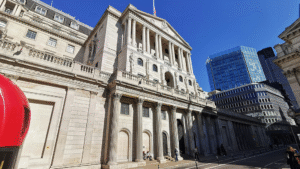
Krona from Sweden has decreased and recreates the slow economy

July 4, 2023: On Thursday, Krona from Sweden reached a renewed record low after the government’s central bank raised speeds and decreased the likelihood of market interventions as the currency collapsed and the economy slowed.
On Thursday, the Swedish currency declined to 0.0844 krona to the euro early after the Riksbank declared it would raise interest prices by 25 basis points. It also dropped against the greenback.
The policy rate currently sits at 3.75%, which aligns with forecasts made by analysts. The bank also expects “at least one more” hike this year.
“Inflation is falling but is still far too high,” the Riksbank said in a statement. New service cost data and a weaker krona mean inflation is losing “more slowly than expected,” it said.
One option available to the Swedish central bank is currency intervention, and it looked as though the Riksbank might have been leaning toward that demand after it started to look at the possibility of hedging a portion of its foreign business reserves. But the Riksbank’s Governor Erik Thedeen expressed this type of move was “not a covert currency intervention,” speaking at a press conference Thursday, according to a Reuters translation. He added he was “very skeptical of currency interventions.”
According to a note by ING, even weakness in the krona could push the central bank closer to intervention in the foreign exchange market. Still, the researchers said threatening action is “more likely” than accepting moving.
Currency intervention is not the first solution the Riksbank would look to bolster the Krona, but “it’s a tool that they have in their toolbox,” said Patrik Sandell, financial risk management director at KPMG.
But he said a currency that persists in cutting could prompt bankers to employ that tool.
“If the slide would sort of rev, then maybe they would view it differently and say, ‘OK, we’re going to put an end to this mild or severe panic in the market,'” he stated. “I would not rule out interventions, but it’s not something they would like to do easily,” Sandell added.
On Thursday, the Riksbank also announced it would increase state bond sales from 3.5 billion kronor to 5 billion each month, effective September, further tightening policy.

Sterling Falls as Slower Wage Growth Fuels Bank of England
The pound weakened after UK data showed slower wage growth, raising expectations of an early Bank of England rate cut

Five Eyes Ministers Unite Against People Smugglers
Five Eyes Ministers unite against people smugglers in London, announcing coordinated action on border security, asylum processing, and transnational trafficking disruption.

Eurozone Inflation Inches Up to 2.1% in August
Eurozone inflation inches up to 2.1% in August, driven by food and services, while core inflation holds steady at 2.3%, keeping ECB policy on pause.

UK Manufacturing Continues to Contract as Orders and Exports Fall
UK manufacturing continues to contract for the 11th consecutive month, with PMI at 47.0. New orders and exports slipped amid tariff pressures and weak client confidence.



















